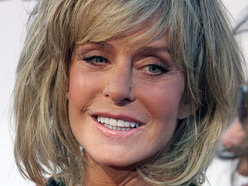| Actress Farrah Fawcett dead at 62 - 2009-06-25 | |
|---|---|
 |
Actress Farrah Fawcett dead at 62 By JIM SLOTEK, SUN MEDIA |
|
|
To be sure, her brain was the last thing on the minds of millions of teenage boys who bought that iconic Farrah “red swimsuit” poster, with the apparently-chilly starlet leaning forward, her thousand-watt smile vying with the rest of her for the lead role. Like Saturday Night Fever (in which it makes an appearance), the poster evokes an era of sexual charge, freed of drama or deep thought — the ’70s as the ’60s, lobotomized. Aaron Spelling was the king of hit shows that could be described in a single phrase — Charlie’s Angels’ precis being “beautiful girls fight crime while running around in T-shirts.” Fawcett wasn’t the first actress to escape the assigned role of “bimbo.” Jane Fonda, for one, did it before her. But hers was a unique hyper-jump — one that pioneered the unofficial acting school of “beautiful women uglying down” that would one day be key to Oscar cred for everybody from Jessica Lange to Charlize Theron to Nicole Kidman. Disturbingly, especially in light of later turns in her personal life, rape and victimization roles were integral to her jump to respectability — The Burning Bed, Extremities, The Beate Klarsfeld Story, the Barbara Hutton biopic Poor Little Rich Girl and another true-crime tale, Small Sacrifices (about a woman who killed her children to “save” her relationship). In fact, Fawcett, who died in a Los Angeles hospital today of anal cancer at age 62, had one more act in her so-very-American life than the “second act” invoked by F. Scott Fitzgerald. She went from object-of-desire in the ’70s to suddenly-serious mini-series actress in the ’80s, to flake-at-large in the ’90s (her infamous Letterman interview, her Playboy pictorials and “body painting” phase) — as if she’d gotten as tired of earnestness as she once did of being dismissed as a bimbo. She was a complicated mix of motivations and passions, as evidenced by Farrah’s Story, the two-hour documentary she filmed with her friend Alana Stewart. The special, which aired May 15 on NBC, told her life story in her own words. She expressed acceptance of her fate, while advocating for alternative cancer treatments and patient confidentiality. Fawcett’s turn from past-expiry-date ’70s icon to respected mini-series actress dovetailed with my own early career as a TV-beat journalist in the ’80s, and I had an opportunity to interview her twice during those years. I led my rave review of 1984’s The Burning Bed — based on a real-life case of a battered wife who ultimately kills her husband — with “I never thought I’d ever be writing these words, but...” And who could blame me? Following her early departure from Charlie’s Angels — which tagged her with the label of “ingrate” on top of all else — she appeared ignominiously in a series of some of the late ’70s/early ’80s worst movies: Somebody Killed Her Husband, Sunburn, Saturn 3, The Cannonball Run. The second-act break for the girl from Corpus Christi, Tex., came in 1983 when she replaced Susan Sarandon on Broadway in the revenge-fantasy Extremities, about a rape victim who turns the tables on her brutalizer with extreme prejudice. A 1986 movie would be made from the play — after her Emmy nom for The Burning Bed. When Fawcett and I talked in 1987 about Hutton — who inherited $45 million in the midst of the Depression, and died penniless after squandering it on seven bad husbands — she said, “Yes, I do get knocked around a little (as Hutton) and, yes, I do get raped. “It kind of lends confirmation to what I was saying when I did The Burning Bed. It doesn’t matter how much money you have or what your status is, you still have to go through life, and women have a certain position in life. They’re weaker ... physically weaker.” Was it a hint from behind the walls of her own life? The only confirmed incident of Fawcett suffering abuse came in 1998 when her then-boyfriend, producer James Orr (Father Of The Bride) was charged with battery for slamming her to the ground and choking her, ostensibly for turning down his marriage proposal. (He was sentenced to three years probation.) Her ’70s fairytale marriage to The Six Million Dollar Man’s Lee Majors was a strained relationship behind the scenes, marked by his admitted drinking problem and jealousy when her fame began to eclipse his. Famously, Fawcett went from Majors to the arms of one of his best friends, Ryan O’Neal, with whom she would co-star in the short-lived sitcom Good Sports. It was a 17-year relationship that would permanently insinuate her into one of Hollywood’s most dysfunctional families. (Redmond, her son with O’Neal, had to get humanitarian leave from prison in order to visit her in her final weeks. Redmond is serving out a narcotics conviction.) Yet both Majors and O’Neal lent support to Fawcett in her final days, with O’Neal acting as spokesperson to break the news earlier this month that Fawcett had opted to cease receiving cancer treatment. (Her weight had reportedly plummeted to 86 pounds in April.) In a note sent to her 91-year-old father, Fawcett reportedly wrote, “I’ve lived a full and wonderful life. I’ve loved and been loved. I’m happy. I’m ready.” |
|
Friends, loved ones remember Farrah Fawcett |
|
Radio WHAT - The Music You Want - Interactive Radio
Listen Live! | On Air Staff |News | Health | Weather | Schedule | Featured Artists | WHAT Gear










